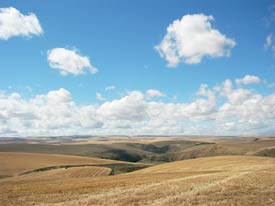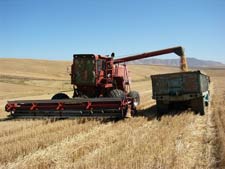
A farmer grows wheat, harvests it, then his wife mills some up into flour and proceeds to sell it. Revolutionary right? Although it may not seem that way, this is pretty ground breaking in this day and age. Grain farmers harvest their thousands of acres, then convey it into a grain elevator somewhere combined with the billions of seeds coming in from other farms. The disparate streams of grain coalesce into one giant silo at the elevator- be it soybeans or wheat or canola seeds. It is no longer farmer Bob’s grain or farmer Mary’s seeds. They are now just a commodity to be marketed around the world and transformed into hundreds of food products that usually bear no resemblance to the original ingredient.
Set upon the steep, sculpted hilltops of the dry and windy Columbia River plateau, soft white wheat dominates the agricultural landscape. This specific variety of highly bred wheat has the evocative university endowed name of CFOSU101 and it is nearly all that is grown. Some of the irrigated flatlands grow hay or pasture for cattle. The occasional experiment of barley or oilseeds or even a different variety of wheat gets planted, but soft wheat is king. You have probably never eaten this particular wheat- most of it is shipped to the Middle East and other foreign lands. But now you just might have the chance. And for those Northwesterners wanting to eat closer to home, Kelly Wheat just might be what you’ll reach for next time you’re hankering for homemade pancakes, waffles, or biscuits.
Mike Kelly is a 5th generation farmer living with his family on the old Kelly homestead near The Dalles, Oregon. He is taking over the helm as his father retires, who took over from his dad after he died in a fast moving wheat fire. Mike always knew he wanted to farm someday but he took his time studying art and business in college and spending the next 10 years restoring old houses in Portland before he landed back on the family farm. When Mike’s father was ready to cede some acreage and responsibility to him, Mike willingly came back to the farm with his wife Anne and their new baby. Two children later Mike is now farming around 2,000 acres, most of it original family land.
At any given time, about half of the Kelly acreage is in production, the other half fallow for a year. Erosion from wind and rain is one of the biggest natural challenges, so the farmers have come to rely on no-till methods. This means that the roots and stalks of the wheat plants are left behind with only the grain harvested on the short stature varieties. This stubble helps anchor the soil over the winter after harvest. Some weeds grown up too, further anchoring the soil, but then are sprayed with herbicides before they go to seed so weeds don’t take over and compete with future wheat plantings. Organic wheat farmers have a more challenging time with the no-till methods because they can’t spray down the weeds. They either have to hand pull, hoe or resort to mechanical tillage. Some wheat farmers run cattle on the stubble and weeds, which does a pretty good job of controlling the weeds, but then you have to find markets for the cattle. Before the invention of herbicides and fertilizers, rotating grain crops with livestock was of course much more the norm.
The vast majority of the Kelly wheat harvest goes to the local co-op- Mid Columbia Producers. But Anne Kelly’s fledgling new business may divert more and more of it to flour. She started by making a pancake mix combining the Kelly soft white wheat with baking powder, sugar, and salt for a ready make mix. Family and friends loved it; wheat farmers who had never tasted their own wheat raved. People encouraged Anne to sell it and the new owners of the historic flourmill in The Dalles thought it would be a neat addition to their new wine bar and events space. The hulking white building that towers over this river town is actually way too big of a flourmill for Anne’s scale- she just uses a small electric home mill at this point. But selling Dalles grown wheat flour in the hundred-year-old flourmill appeals to the historian and locavore in all of us.
Local bakers have taken notice of Kelly Wheat’s flour mix and are now using her bulk flour to produce biscuits, muffins, and other baked goods. Anne is considering scaling up, but needs some larger, more reliable markets and scaled-up equipment. Right now she must bring the uncleaned wheat to the neighboring town of Biggs to be cleaned of chaff, weed seeds, and other impurities. Then she brings it home to her certified kitchen to be milled in small batches (just one pound a minute). She then mixes in the other ingredients, hand fills little bags, staples the tops, applies a label, packages them in boxes, and drives the mix around to a few accounts she has cultivated in The Dalles and Hood River.
Finding appropriately sized equipment is especially difficult- mills are either designed for the home baker or the giant wholesale mill. Sizes in-between are difficult to find- she will probably have to do a little traveling to find it all. Farmers I’ve interviewed around the country have relayed to me this same conundrum of finding appropriately scaled equipment for on-farm processing and direct marketing. Without it, they have to drive hundreds of miles to get it all done, often at a very high cost per unit. The other option is to sell off their farm foods to intermediaries or at auctions, earning very little for their labors. Fabricators, machinists, and agricultural engineers take note: we need more small-scale commercial equipment for farming and food processing. This could generate a slew of new businesses for those willing to fill this important need.
When I asked Anne what she wished more Americans would understand about agriculture, she said the most important thing they can do is to “pay more attention to what we eat and (re)learn how to cook again”. Americans, she remarked, “love to eat, but they don’t love food”. If they did love food, they would care more about the freshness and quality of the ingredients, preferring to support their local family-farms over international conglomerates for their sustenance. I will take a Kelly wheat homemade waffle over a frozen, plastic-wrapped toaster waffle any day, thank you very much.

